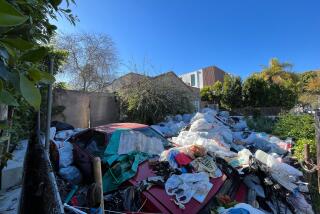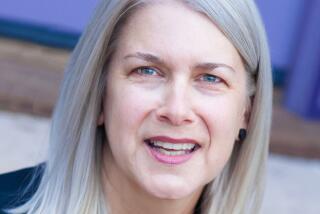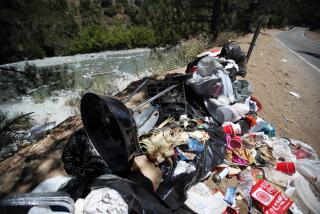Edward Humes enjoys digging through rubbish
Edward Humes is a man of eclectic storytelling tastes. A former journalist awarded a Pulitzer Prize in 1989 for a series of stories he wrote for the Orange County Register on the military establishment in Southern California, Humes has written 11 nonfiction books on subjects including how the GI Bill transformed the American Dream, Southern justice and the Dixie Mafia, and the juvenile justice system in Los Angeles County. His latest book, “Garbology: Our Dirty Love Affair With Trash” (Avery: 278 pp., $27) covers a subject that most of us take for granted: the world of garbage. We caught up with Humes and asked him about his writing process and the dirty business of trash.
--
How do you pick your subjects? Why trash, why now?
The subjects vary, but there is a common thread: each has a strong narrative attached to it, and the possibility of immersing in a world apart.
Delving deep inside the Los Angeles juvenile court and exploring the secret life of trash were vastly different experiences, but each in their own way yielded fascinating, revealing, sometimes horrifying, other times uplifting characters and stories.
“Garbology” completes a trilogy of environmental books that began with the ecological heroes of “Eco Barons,” followed by the business sustainability revolution chronicled in “Force of Nature.”
During both projects, waste surfaced again and again as the core issue behind our toughest environmental, energy, climate and economic problems. It’s the biggest thing we make, and it’s connected to everything.
All you have to do is go to Puente Hills and stand atop the state’s biggest man-made structure, a mountain of garbage 500 feet tall, with a plateau at top that could swallow Dodger Stadium, parking lot and all, and you know there’s got to be a better way of dealing with our garbage.
--
What were themost surprising things you found about trash in America or the world in writing the book?
America’s biggest export is trash -- the scrap paper and metal we throw away. The Chinese buy it, make products out of it, sell them back to us at enormous profit, and we turn it into trash again. America, the country that once made things for the world, is now China’s trash compactor.
The average American community spends more on waste management than fire protection, libraries, parks and recreation and textbooks.
Things are much worse than the official stats suggest. The EPA, which publishes our annual “trash bible” of municipal waste statistics, uses an outdated method that vastly underestimates our waste and overestimates our recycling.
--
What can we learn about ourselves from our trash?
If you could sit down with a year in the life of your waste bins dumped on your front lawn, you’d be shocked by the size of the mound: 1.3 tons, on average. That’s 50% more waste than your Danish counterpart makes, and nearly three times as much as the average Japanese citizen.
--
Did your family’s buying, consuming/trash habits change during the course of the book?
Absolutely. My family has tried to cut down on waste by refusing the trashiest stuff (plastic shopping bags, excessive packaging, non-recyclable products, disposables) and repurposing or recycling the rest. It’s a start. Bea Johnson of Mill Valley is one of the characters in “Garbology”; she chronicles her family’s efforts in her ZeroWasteHome blog (www.zerowastehome.blogspot.com). Their non-recyclable trash is down to one mason jar-full a year; their modified shopping habits have cut their household budget 40%.
--
What’s next for you, the natural history of composting?
Actually, I’m writing a very different story: the biography of Jess Jackson, the cop-turned-lawyer-turned-horse-racing superstar-turned-billionaire winemaker who put chardonnay on America’s tables when he founded the Kendall-Jackson family wine business.
--
--
Edward Humes at the Festival of Books
Panel: “Disposable Nation: Trash and Consequences”
When: 12:30 p.m. Sunday
Where: Hancock Foundation on the USC campus
Who: Edward Humes, Kendra Pierre-Louis, Anna Sklar, moderator Madeleine Brand
For more information: events.latimes.com/festivalofbooks
More to Read
Sign up for our Book Club newsletter
Get the latest news, events and more from the Los Angeles Times Book Club, and help us get L.A. reading and talking.
You may occasionally receive promotional content from the Los Angeles Times.






